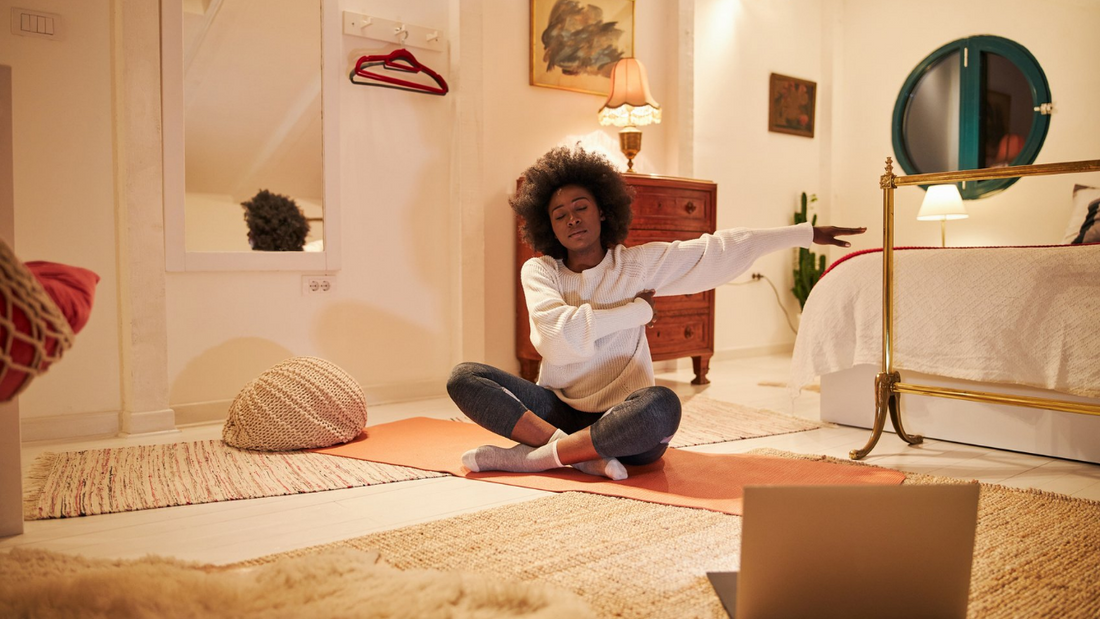Read Time: 4 min | Categories: Mental Health and Sleep
The 5 Best Stretches to Do Before Bed
Patience Lister, BSc
Share this article
Sleeping may sound easy, yet 36% of Canadian adults struggle to get enough sleep when they’re stressed.[1] And with almost half of Canadian workers feeling at least a little stressed on most days, this can add up to a lot of sleepless hours.[2]
Getting the recommended 7–9 hours of sleep per night is critical to your mental health, so taking extra steps to help catch more ZZZs is well worth your effort.[3] As part of your sleep hygiene practices, such as maintaining a regular bedtime and avoiding caffeine and alcohol late in the day, research shows that ending your day with a routine of bedtime stretches is beneficial for your sleep.
Research Supports Stretching Before Bed
Studies suggest that incorporating stretching and movement into your bedtime routine can help with.[5]
- Transitioning you into a mindset for sleeping
- Promoting a deeper state of mental and physical relaxation
- Increasing the amount of time you sleep
- Improving sleep quality
There are various stretches that you can do to help transition your mind and body from a busy day into a state of relaxation before sleep. The trick, however, is to keep your movements gentle and flowing calmly from one to another. Remember that unlike your daytime workout, bedtime stretches are not intended to increase your heart rate or boost adrenalin levels.
The 5 Best Stretches to Do Before Bed
Here are 5 relaxing stretches and how you can do them before going to sleep:
 Neck Stretches
Neck Stretches
This sequence of three stretches is a must for anyone who holds stress in their neck and shoulder muscles.
1. In a sitting or standing position with your shoulders back, lower your chin to your chest. Hold for 20 seconds and then lift your chin to the starting position.
2. Keeping shoulders straight, turn your head to one side and hold for 20 seconds. Repeat on the opposite side.
3. Tilt your head to the side by bringing your ear toward your shoulder and hold for 20 seconds. Repeat on the opposite side.
 Kneeling Forward Tuck
Kneeling Forward Tuck
Stretch your back and hip muscles with this restful position.
1. In a kneeling position with your buttocks on your heels, lean forward and rest your forehead on the floor. If you cannot reach the floor, place a pillow under your forehead.
2. Position your arms next to your legs with palms facing up.
3. Hold for at least eight deep, slow breaths.
 Legs Up the Wall
Legs Up the Wall
Putting your legs up against a wall can be a huge relief after a full day spent sitting or standing.
1. With your knees bent and your back and head flat on the floor, position your buttocks close to the lower edge of a wall.
2. Slowly lift your legs up the wall and scoot your buttocks as close to the wall as comfortable, keeping your tailbone on the floor.
3. Hold the pose for about two minutes, while taking deep, slow breaths.
4. Slowly return to a sitting position.
 Lying Spinal Twist
Lying Spinal Twist
Use this spinal twist to help stretch tense back muscles.
1. Lie on your back with your arms out to the sides in a T position and your legs straight. Bend your right knee and place your right foot on your left knee.
2. Using your left hand, slowly push your right knee toward your left side while twisting your lower back.
3. Repeat the stretch on your other side.
 Bear Hug
Bear Hug
This simple stretch is both a comforting and fantastic way to stretch your upper back muscles before bed.
1. In a standing position, open your arms wide.
2. Bring your arms back toward your centre, crossing your left arm over your right arm to give yourself a big hug.
3. Hold the stretch for 20 seconds.
4. Repeat the stretch with your right arm crossing over your left arm
Natural Support for Stress
If you still find it difficult to get a good night’s rest despite practising healthy sleep hygiene and bedtime stretches, you may want to consider some extra support. Webber Naturals’ Sleep & Stress Bundle, which includes melatonin, magnesium, and B vitamins, consists of three staple supplements that can help you cope with stress and encourage better quality sleep.
Melatonin Maximum Strength Quick Dissolve comes in easy sublingual tablets, providing a convenient way to reset your sleep routine by helping you fall asleep and stay asleep.[7] Magnesium contributes to maintaining proper muscle function, helping you relax tense muscles, and B vitamins nourish the nervous system during the day to help it meet extra demands in stressful times.[8]
Making some simple additions to your routine with bedtime stretches and natural supplements can improve your rest and relaxation and make sleepless nights a thing of the past.
